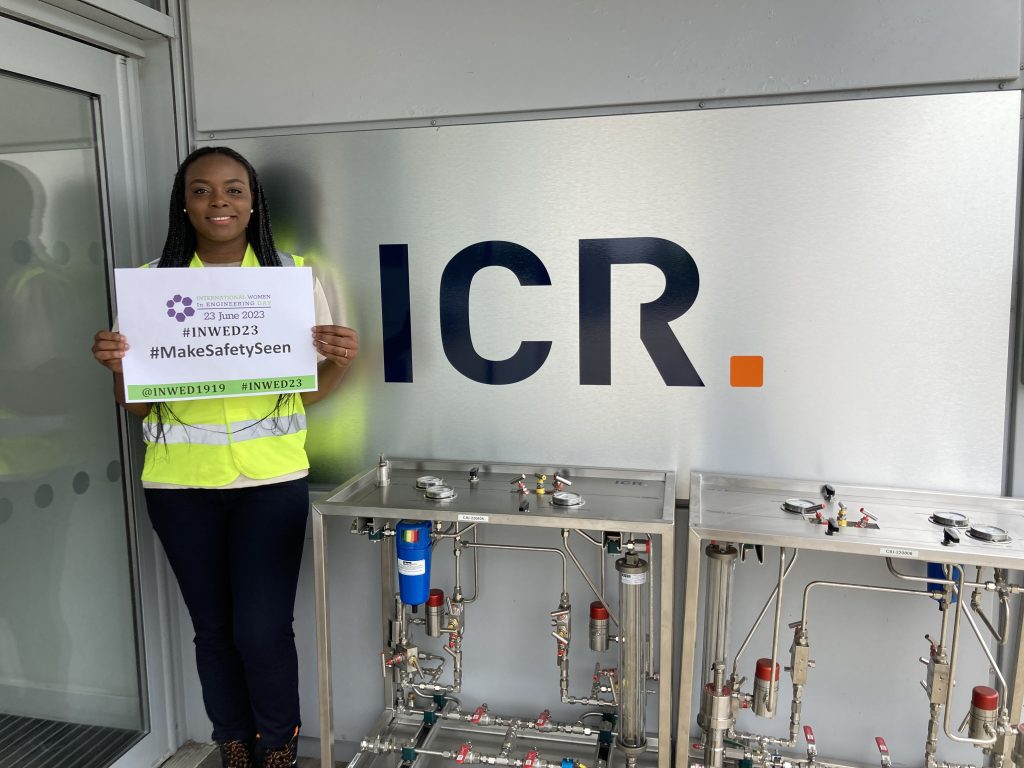Solving problems, working as part of a diverse team and delivering projects that really make a difference – engineering is an exciting professional choice.
Today is International Women in Engineering Day. Each year, I’m glad to say, this awareness day seems to increase in scale and profile.
I’d like to think this momentum can encourage more and more women to consider a career in engineering.
While women remain hugely under-represented, with figures indicating that in the UK only 16.5% of engineers are women, you’ll be surprised by how many women you will find in this field – whether lecturers, engineers or fellow students. I never see gender, there is no distinction. I just see classmates and colleagues.
I don’t see any barriers to it being a sound career choice that’s full of opportunities for women.
My own journey started in Nigeria where I first discovered my interest in science in secondary school at the Federal Government Girls’ College, Abuloma, Port Harcourt. My earliest memory of finding my passion was in chemistry class. I had an amazing teacher and took private lessons to explore it further.
From there, I gained my degree in Petroleum Engineering from the University of Mines and Technology in Tarkwa, Ghana, and, through the National Youth Service Corps, went on to work in a safety role at a civil engineering company in Nigeria for a year.
In 2019, I decided to broaden my horizons and study for an MSc in Oil & Gas Engineering at Robert Gordon University (RGU) in Aberdeen. The first part of the course was very enjoyable but the second – due to Covid – was tough. It was challenging to study online, but I got through it and just a month later, I started my second masters – this time in Project Management, again at RGU.
It really broadened my skillset, as did a 12-week internship with a North Sea operator, which gave me a better understanding of projects and working as part of a team. Project management was more daunting for me. It was a move away from engineering into a business and management course. So much of what I do is a mix of engineering and project management principles and practices, so that knowledge and experience was really important.
I’m now 11 months into a graduate engineering role at ICR and enjoying it very much. I saw the position and thought it fitted perfectly with what I wanted. It’s a two-year structured graduate programme, with three-month milestones across all aspects of my work and learning. This would lead me to become a project engineer, having learned from experienced engineers and become acquainted with all the different disciplines.
My day-to-day work is dynamic and fast. I’m given the responsibility to deliver projects, with the right amount of support from senior colleagues. It involves engaging with clients and solving problems – whether it involves new built chemical injection packages, pressure testing systems, instruments sizing, process/utility calculations, managing procurement for projects, rental equipment or supporting other departments in ICR. Genuinely, no two days are the same.
You could be working on an assigned project and have a clear plan for that but then something comes in and you have to put that scope of work on hold to prioritise the one that needs done with a shorter timescale. I get to collaborate with people from design, process, industrial production, workshop, technicians, procurement, supply chain, logistics … people inside and outside the company. It’s thrilling, it’s exciting. There’s never a dull moment.
I enjoy how the company solves problems through innovative products such as Technowrap and Quickflange, and appreciate the culture of the business with its commitment to net zero solutions and its Environmental, Social and Governance (ESG) responsibilities.
As I develop my engineering career, I have been supported by the team at ICR, in particular my line manager Alan Simpson as well as Project EngineersJames Black and Keith Harper. I’m learning so much from the people around me.
As a student, I was a member of the Society of Petroleum Engineers Young Professionals. I am also part of AFBE-UK – a diversity and inclusion group that supports young people into careers in engineering – with their Transition and NextGen event which visit schools and collaborate with companies. I’m a beneficiary of this type of programme. It’s how I came to love what I do, and I’d encourage others to do the same.
What would I say to a 14-year-old girl who has a passion for a science and a desire to work in engineering… go for it! Take it seriously, look for females working and studying in science and engineering, speak to them about their experiences, break through the stereotypes.
If it’s what you love, make a path for yourself.
International Women in Engineering Day, organised by the Women’s Engineering Society (WES), celebrates its 10th year in 2023 and is once again promoting the amazing work that women engineers do across the globe. This year’s theme, incidentally, is Make Safety Seen.
Are there challenges in having a career in engineering? Yes, but there are also great opportunities across multiple sectors and roles. It’s a dynamic, diverse and exciting career choice – one I would wholeheartedly recommend.


